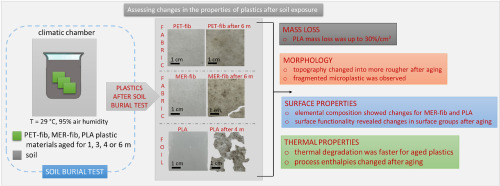The (bio)degradation of plastics in soil is a complex process that depends on several factors, such as the type of plastic, environmental conditions, microbial activity, and the presence of other organic matter in the soil. Ageing in soil thus also influences the physicochemical properties of plastic materials to understand the mechanisms and investigate the changes in plastic properties in soil due to decomposition and followed by fragmentation, the gravimetric, morphological, surface, and thermal properties of plastics were studied some of them for the first time. The study was performed for three different plastics materials, polyethylene terephthalate (PET-fib) and melamine etherified resin (MER-fib) in the form of nonwoven fabrics and polylactic acid (PLA) in the form of foils. The materials were exposed to soil for one, three and six months, only in the case of PLA foil for final four months. The results show that remarkable changes were observed especially for MER-fib and PLA after exposure to soil, which is related to the bio and chemical degradation proceses. The biodegradation process was indicated with the soil microorganisms used in the study (lactic acid bacteria, photosynthetic organisms, yeasts, actinomycetes, and enzymatically active fungi), while chemical degradation showed that it may occur at the surface of the material with changes in elemental composition and chemical functionality. The microbial end products of biodegradation of MER-fib are presumably NH3 and CO2, while for PET-fib it is CO2 and for PLA it is CO2 and H2O, including several proposed conversion products in partial pathways. The study represent an important contribution to understanding the behaviour of the analysed (bio)plastics and the changes in their properties after exposure to natural systems for pollution countermeasures and cleaner production.



